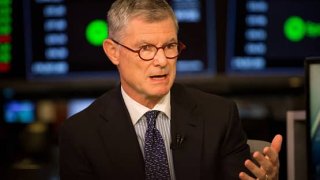
- Peloton announced Tuesday it plans to replace its founder and CEO John Foley and cut 2,800 jobs, or about 20% of corporate positions.
- Barry McCarthy, the former chief financial officer of Spotify and Netflix, will become CEO and president and join Peloton's board.
- Peloton said it expects to slash roughly $800 million in annual costs and reduce capital expenditures by about $150 million this year.
Peloton is replacing its CEO and cutting roughly 20% of its corporate workforce as it hopes to win back investors' confidence and reset its business for growth coming out of the pandemic.
The announced changes come days after reports circulated that Peloton could soon be a takeover target. Shares surged on hopes of a deal would be struck with a tech giant or athletic apparel behemoth. But news of a management shakeup and strategic overhaul make this path seem much less likely, at least in the near term.
Get Philly local news, weather forecasts, sports and entertainment stories to your inbox. Sign up for NBC Philadelphia newsletters.
The connected fitness company announced Tuesday that Barry McCarthy, the former chief financial officer of Spotify and Netflix, will become CEO and president and join Peloton's board. McCarthy, 68, currently serves on the board of delivery start-up Instacart.
Founder John Foley will step down from the CEO post, and become executive chairman of the board.
Peloton shares closed Monday up more than 25%, at $37.27, bringing the company's market cap back up to about $12.2 billion.
Money Report
"Since founding Peloton a decade ago, we've grown this brand to engage and motivate a loyal community of more than 6.6 million members," said Foley, in a press release announcing the leadership changes. "I'm incredibly proud to have worked with such talented teammates over the years who have helped me build Peloton into what it is today, and I'm confident that Barry is the right leader to take the company into its next phase of growth."
Foley pointed to McCarthy's previous experience managing subscription business models and digital streaming companies. He's also been a consultant for Peloton investor Technology Crossover Ventures.
Cost cuts across the business
The news of Foley stepping down, along with other cost-cutting measures, came ahead of the release of Peloton's fiscal second-quarter results. In January, Peloton reported preliminary quarterly revenue and subscriber figures, but Tuesday's announcement also included a lower forecast for the year.
Peloton now anticipates fiscal 2022 revenue within a range of $3.7 billion to $3.8 billion, down from prior expectations of $4.4 billion to $4.8 billion.
The company also said it will end the year with about 3 million connected fitness subscribers. Previously, it projected it would have 3.35 million to 3.45 million. These are people who own one of Peloton's products and also pay a monthly fee to access its on-demand content.
Peloton said it expects to slash roughly $800 million in annual costs and reduce capital expenditures by roughly $150 million this year.
It plans to wind down the development of its Peloton Output Park, the $400 million factory that it was building in Ohio. It said it will reduce its delivery teams and the amount of warehouse space it owns and operates.
"The decisions we have made will make us a leaner and more nimble organization that is better able to execute against our sizable growth opportunity," said Foley, in a separate letter to shareholders.
Peloton is expecting to cut 2,800 jobs, or about 20% of its corporate positions. The cuts won't affect its instructor roster or content. But Foley did announce that his wife, Jill Foley, is leaving her role as vice president of Peloton's apparel business. CNBC reported last month that the division was struggling recently to meet its internal goals.
Peloton employed 6,743 people in the United States as of June 30, more than double the roughly 3,281 employees it counted a year earlier, according to annual filings.
Activist Blackwells says the moves aren't enough
Peloton had ramped up its staffing and manufacturing during the Covid pandemic, when demand for at-home exercise equipment surged. But the company miscalculated how sustainable this trend would be. As consumers became vaccinated, many headed back to gyms and interest for Peloton's equipment slowed. The company also botched how it handled a recall of its treadmills.
Roughly a week ago, activist Blackwells Capital — which has a less than 5% stake in the company — sent a letter to Peloton's board urging Foley to quit his role as CEO, and asking the company to consider selling itself.
Reports have since circulated that potential suitors could include Amazon or Nike. However, Foley along with other Peloton insiders had a combined voting control of roughly 80% as of Sept. 30, which would make it practically impossible for any deal to go through without their approval.
Following Tuesday's news, Blackwells Chief Investment Officer Jason Aintabi said the actions don't go far enough.
"Peloton CEO John Foley naming himself Executive Chairman and hiring a new CFO does not address any of Peloton investors' concerns," Aintabi said in a statement. "Mr. Foley has proven he is not suited to lead Peloton, whether as CEO or Executive Chair, and he should not be hand-picking directors, as he appears to have done today."
Foley, 51, founded Peloton in 2012. He previously served as the president at Barnes & Noble. Foley also brought on his wife, Jill, to lead up Peloton's apparel business — a decision Blackwells has also criticized.
As part of the management changes, William Lynch, Peloton's president, will step down from his executive role but remain a director. Lynch, a former Barnes & Noble CEO, was brought on by Foley in 2017 to help drive growth.
Erik Blachford, a director since 2015, will leave the board. And two new directors will be added: Angel Mendez, who runs a private artificial intelligence company focused on supply chain management, and Jonathan Mildenhall, former chief marketing officer of Airbnb.
In a release announcing the board appointments, Pamela Thomas-Graham, chair of the nominating committee, said the appointments came after a months-long search. With these changes, Peloton's board will have nine directors.
"As Peloton continues to evolve, we are committed to regularly evaluating our board's composition to ensure we have the right mix of skills and experience to advance our goals," said Thomas-Graham, who is the founder and CEO of online publishing company Dandelion Chandelier Media.
Peloton's market value had surged to roughly $50 billion about a year ago, but was recently hovering around just $8 billion, before news over takeover talks started circulating.
Tuesday's rally helped the stock recoup some of its recent losses. Shares had fallen below the stock's IPO price of $29 on Jan. 20, after CNBC reported that Peloton was adjusting its production levels to meet lower demand.






